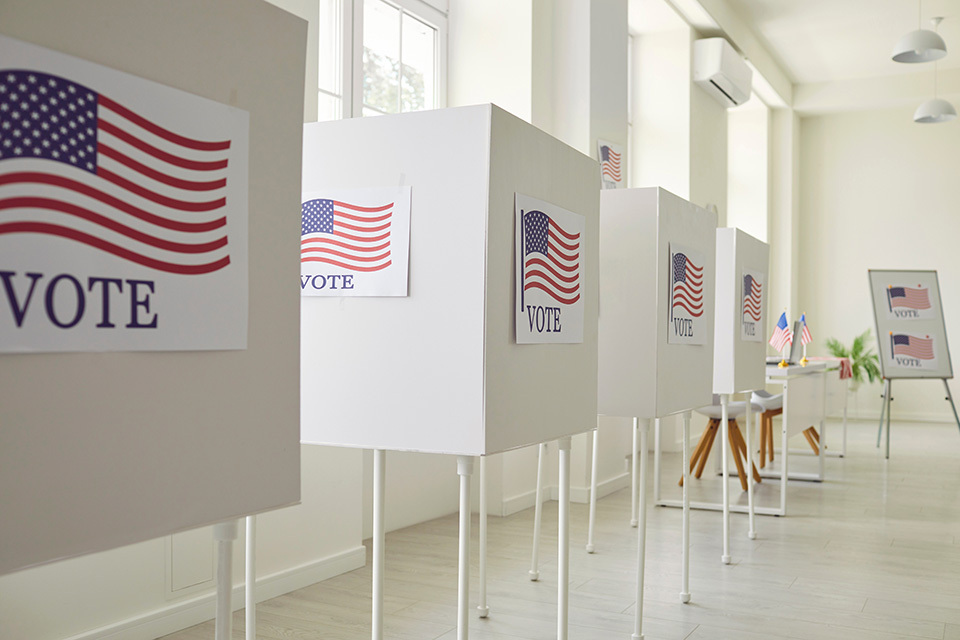Memo Published July 10, 2024 · 6 minute read
Noncitizens Cannot Vote
Jeremy Odrich

Immigration is a top issue for voters, and Republicans are fully exploiting that fact. Rather than passing legislation that addresses faults in our immigration system and restores order at the border, Republicans are focused on spreading misinformation and fearmongering about immigrants. Donald Trump has said that immigrants are “poisoning the blood of our country” and Texas Governor Greg Abbott said there is an “invasion” at our southern border. Now their latest claim is that noncitizens can vote in federal and state elections.
Who Can and Cannot Vote
The notion that noncitizens are voting in federal and state elections is not new. In 2016, Donald Trump claimed that he lost the popular vote due to illegal voting by millions of undocumented immigrants. He created a voting integrity commission that uncovered zero evidence of noncitizen voting and was later disbanded. And in 2020, Donald Trump made similar claims of election fraud that were struck down over 60 times in court. Unfortunately, a lack of evidence has not stopped Republicans from spreading these false claims.
Just this year, House Republicans introduced two bills banning noncitizen voting nationwide, one of which has already passed the House with the other set to come to the floor this week. Similar efforts are occurring at the state level, with at least six states placing noncitizen voting restrictions on the upcoming November ballot. Outside of legislative proposals, Republicans have spread this theory across traditional news and social media platforms.
There is just one problem—noncitizen voting is already illegal. In every state from coast to coast, noncitizens are prohibited from voting in federal and state elections. For confirmation of this fact, we need only look at existing U.S. law. The National Voter Registration Act of 1993 (NVRA) requires that states use a standardized form to register voters that includes a declaration of citizenship with penalty of perjury. Applicants are not just taken at their word, however. States verify citizenship by checking against the databases of Social Security, birth certificates, and driver’s licenses. Aside from this citizenship test, the law plainly states who can and cannot vote.
You can vote in federal and state elections if:
- You are a citizen.
- You meet your state’s residency requirements.
- You are 18 years old on or before election day.
- You are registered to vote by your state’s deadline.
You cannot vote in federal and state elections if:
- You are a noncitizen or permanent legal resident.
- You have been convicted of a felony (some states offer exceptions after time is served).
- You have a mental disability that impairs your “competence” in filling out a ballot.
- You live in a U.S. territory.
Not only is noncitizen voting illegal, but the consequences are severe, including prison time and deportation. And aside from the strict legal deterrents, there is no logical basis for noncitizens to break the law and vote in our elections. Noncitizens have traveled thousands of miles, surmounted dangerous terrain, and established a new life here. To risk it all just to cast one ballot in an election with millions of other voters is simply not worth it.
Research confirms this fact. The conservative Heritage Foundation looked at legal action taken against noncitizens for voting between 2003 and 2022. Across the 19-year period, Heritage found just 25 instances of noncitizen voting. The nonpartisan Brennan Center examined 42 jurisdictions with the largest noncitizen populations in the United States during the 2016 election. They found that across the 23.5 million votes surveyed, there were only 30 incidents of suspected noncitizen voting or just 0.0001% of the vote. Further examination found these 30 incidences were likely the result of noncitizens being confused about their voting eligibility and not an attempt at voter fraud. Research from the libertarian Cato Institute found similar, that noncitizen voting is the statistical equivalent to zero. These studies represent just three of dozens confirming the same fact: noncitizens do not illegally vote in our federal and state elections. And in the extremely rare instances in which noncitizens do break the law and vote, they have been prosecuted.
Noncitizens and Local Elections
There is one caveat worth adding. In just 16 of the over 3,000 counties in the United States, noncitizens are allowed to vote exclusively in local elections, like city council or school board. This does not apply to federal or state elections; it only applies at the local level. The logic behind giving noncitizens a say in these hyperlocal elections is straightforward. Noncitizens pay billions of dollars each year in local taxes, they send their children to local schools, and they contribute to their local communities. Given these contributions, a handful of counties in California, Maryland, and Vermont have decided noncitizens should have a say in who governs at the local level.
The 16 counties that allow noncitizen voting in local elections relied on ballot measures to do so, meaning that residents democratically decided to approve their participation in local elections. This reflects the ability of communities to make individualized choices about their own governance—and it in no way impacts eligibility for state or federal elections.
Conclusion
So, if noncitizen voting is illegal, rare, and harshly punished, why are Republicans proposing legislation to further crack down? The unfortunate answer is that they are beginning to undermine the November election should Trump lose. As has been noted, Donald Trump made similar false claims about noncitizen voting in 2016 and 2020. Even when he could not provide evidence to support his claims, Trump doubled down. This time is no different.
Republicans are following a simple playbook where they perpetuate the noncitizen voting myth and try to pass messaging bills “banning” something that is already illegal. It is nothing more than political theater. If Trump loses on election night, he will point to these bills, their Democratic opposition, and noncitizens writ large as evidence of foul play in our elections. He has done this twice before and we should be prepared for him to do it again.
We cannot fall for this ploy. Baseless accusations of noncitizen voting have no place in our national discourse. The law is clear: noncitizens cannot vote in federal or state elections, and the data confirms that they don’t.
